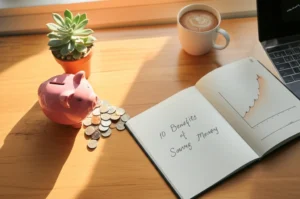Quick Wins First
Let’s cut to the chase—so you want to know how to save money from salary in bank without getting tangled in “expert” advice that just leaves you feeling lost or behind. Perfect. You’re not alone. Honestly, the biggest mistake most people make? They treat saving like it’s whatever’s left over, not a real part of their plan. And that is where things go sideways, fast.
What if, this month, you made saving as normal as paying your rent? Here’s how you can flip the script and start socking away money—even if your salary’s not huge, even if you’re living on a shoestring right now.
Set Your Savings on Autopilot
Okay, Team You: here’s your first power move. Before you start spending, pick a flat amount or a safe percentage to move to savings every single payday. This isn’t some magical math—this is literally you paying yourself first, right off the top. You’ll feel like a boss, and your future self will thank you for it. The trick here is making it automatic: set up an auto-transfer from checking to your savings account the moment your salary drops. That way, it’s out of sight, out of mind.
If you’ve ever thought “I can’t save, my bills eat up everything,” guess what? Most people feel that way until they see how much little leaks in spending add up. Automation quietly plugs those leaks for you.
Why Saving in The Bank Matters—And Where It Can Trip You Up
Savings in the bank keep you safe from surprise expenses (way less stress), let you grab opportunities, and grow slowly with interest. Plus, banks are generally safer than a cash stash under the mattress.
But, fair warning: if you jump in too fast, saving too much at once, you might end up pulling money right back out—especially if your payment schedule is wonky or you have a single big expense. Always leave enough for the non-negotiables, and start with an amount so small you don’t feel it. You can always bump it up later.
How Much Should You Really Save?
Don’t let anyone tell you there’s a one-size-fits-all answer. But most smart plans recommend targeting 15%–20% of your take-home pay for savings if you can swing it. Sometimes, life throws you curveballs and you have to go lower. That’s OK—consistency beats perfection every time! Try out the how to save money from salary calculator to figure out what number makes sense for you. It crunches your salary, expenses, and goals in seconds, so you’re not just guessing or hoping for the best.
| Income Rule | Savings Target | Best For |
|---|---|---|
| 50/30/20 | 20% | Typical budgets, easy to start |
| 50/15/5 | 15% retirement, 5% emergency | Those with long-term plans |
| Pay Yourself First | $5–$50 (or more) first, then spend | Anyone, any income |
Your goal is to start anywhere, not to hit some mythical perfect percentage your first week. Even saving 5% of your take-home pay is better than zero, especially if you set it on autopilot and let time do its thing according to PSBT’s guide.
Tools That Make It Impossible to Forget
Here’s a not-so-secret trick the financially savvy use: direct deposit splitting. If your employer lets you, have part of your salary land straight in your savings account and the rest in checking. It’s like hiding money from yourself, but for good reasons.
Or, log in to your online banking (most banks are pretty slick these days) and set up a “standing instruction” or automated recurring transfer. Want to save only from certain paychecks? You can pick which days, which account, whatever fits your real life.
And banks are adding cool features now—auto-roundup (saving the small change from every debit card purchase) and goal-based accounts. It’s like your savings is working out in the background while you binge your favorite show.
Building a Budget—No Drama, No Shame
Budgeting. That word can set off groans or even panic. But hear me out: a budget isn’t about punishment—it’s about control. Think of it as drawing your own playbook, not following someone else’s rules.
Start by listing your salary after taxes and anything else the government takes. Write down (yep, no shortcuts) every fixed bill, every “must-have expense,” and what you need for everyday life. Whatever’s left? That’s your saving potential.
Cutting back on the noisy, small stuff (extra subscriptions, double-takeout, impulse streaming upgrades) unlocks more savings potential than you think. And it hurts less than skipping all the fun bits of life.
How to Save If You’re Barely Getting By
Saving money from your salary when funds are tight? Totally possible—just start even smaller, and be hyper honest about what you need each month. Let’s say you earn 20,000: check out this how to save money with 20,000 salary real-life playbook. You’ll find creative budgeting hacks, clever ways to save money (free local events, home cooking parties, or “challenge weeks”), and see how to build up a safety net, bit by bit. Some months you might dance around bills, others you’ll stash a little more—but you’ll always be moving forward.
And if you want to supercharge your savings pace, focus first on your emergency cushion. A small, reachable goal—like a $500 buffer—makes every other part of your money life less scary. Once you have it, grow it up to a month’s expenses, then two, until you hit three to six months. You know the saying: “You have to walk before you run.”
Ways to Grow Your Savings Safely
So you’re stacking money in the bank—awesome! But don’t settle for pennies in interest if you can do better. Look for high-yield savings accounts or even short-term deposits (like CDs) with safe returns. Always check fees—and double-check the account is insured (FDIC or NCUA, depending on type). If you’re tempted by “investment” accounts, just know these are not the same as parking money for emergencies. Safety first, always.
| Account Type | Pros | Cons |
|---|---|---|
| Regular Savings | Simple, easy access, insured | Low interest, temptation to spend |
| High-Yield Savings | Better rates, safe, liquid | Sometimes online-only, may have limits |
| CDs/Fixed Deposits | Higher rates, FDIC/NCUA insured | Locked in, early withdrawal penalties |
Clever Tricks For Consistency
Want clever ways to save money without feeling deprived? Try this:
- Whenever you get a salary raise or side hustle income, bump up your auto-transfer by a little instead of letting lifestyle creep eat it all up.
- Do a “no-spend day” once a week and transfer the unused money straight into your savings—that adds up way faster than you think.
- Reward yourself for sticking to your plan, but keep rewards small and meaningful (a new coffee, a book—nothing wild).
- If you get seasonal or variable pay, try saving a bonus chunk or half of any overtime right away, so it never feels like a loss.
There are people who make saving look easy, but the reality is: it’s all systems and tiny little habits, not magic or misery. You can totally do this with the tools you already have.
Keep An Eye On Progress
The biggest secret to not giving up? Watch your savings grow. Use banking apps to set goals and get alerts—heck, turn saving into a scoreboard game if that fires you up! And circle back to your plan quarterly or whenever your pay changes. Celebrate every milestone—yes, even that first $100 cushion, because that’s where momentum starts.
As you get more comfortable, try using budgeting apps or calculators (how to save money from salary calculator is a good start) to check in on your progress and tweak your habits. The more curious you get about your money, the faster you’ll see those little deposits turn into something really worth cheering about.
Your Three-Month Kickstart Plan
If all this sounds overwhelming, let’s break it down into little wins:
- First month: Start your first auto-transfer, even if it’s just five bucks. Cancel one bill or sub you don’t need. Use a calculator to test if you can save more.
- Second month: Nudge that savings transfer a little higher, just once. Try tracking expenses daily or weekly and see how it feels.
- Third month: Open a new (better!) savings account or switch to something with higher interest, if possible. Lock in the habit, then enjoy weeks where you just…don’t think about it for days at a time.
This isn’t a race, but every step you take moves you ahead of where you started.
What’s Your Next Move?
Look, saving money from your salary at the bank isn’t about being perfect or living like a monk. It’s about being intentional in small, doable ways, and watching those tiny shifts change your story for good. There’ll be months where things go sideways (we’ve all been there), but the real win? You’re showing up for yourself and turning “maybe later” into “I got this.”
If you want to crunch your numbers, try a how to save money from salary calculator. If your income’s on the lower end, or you hustle to make ends meet, check this guide on how to save money with 20,000 salary—it’s packed with realistic steps and a few pleasant surprises.
So, what do you think—ready to switch from wishing you could save, to knowing that you can? Got tricks or stories of your own? Or maybe there’s something you’re stuck on—reach out! We’re all figuring this out as we go, and together, we can make keeping money in the bank actually…fun.











